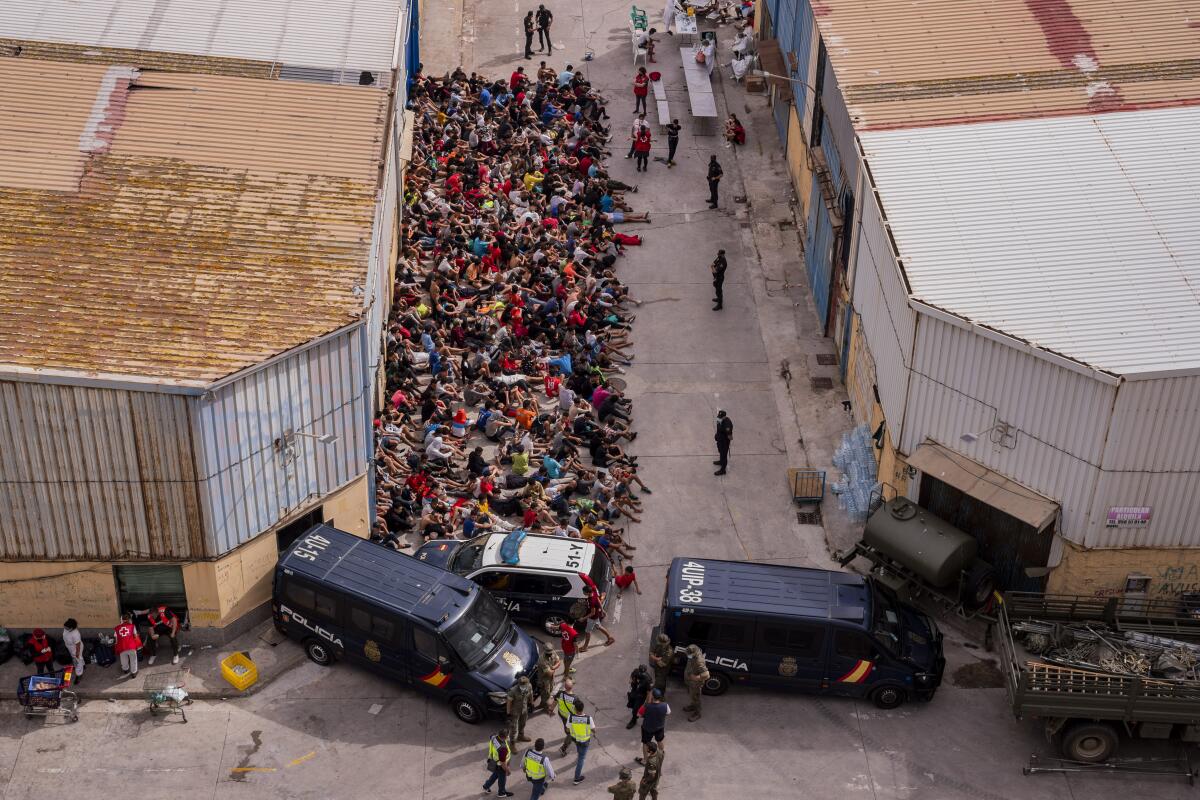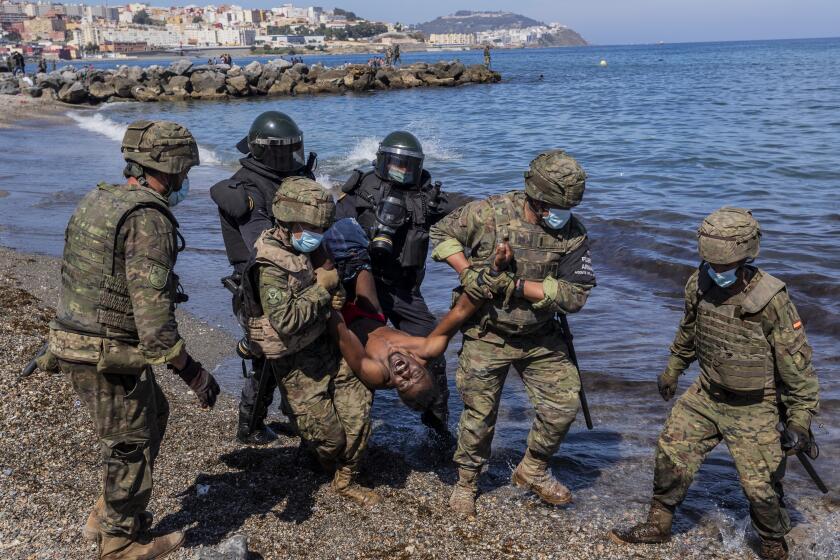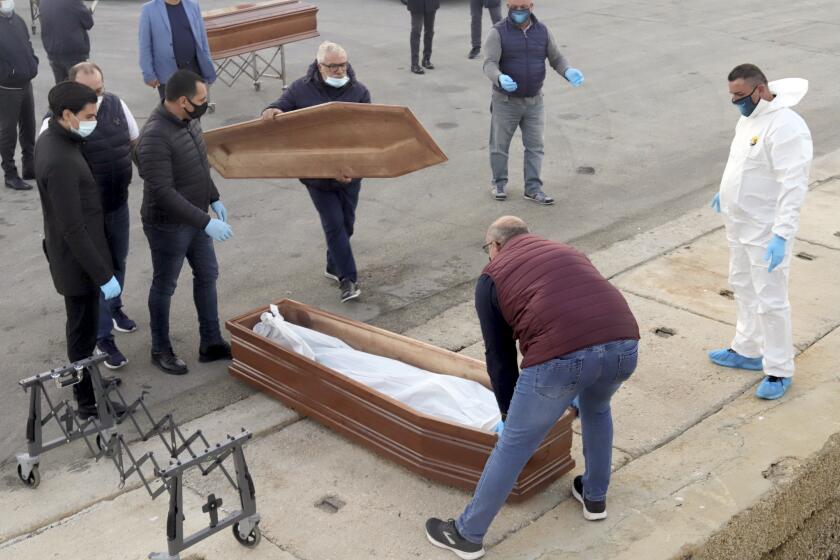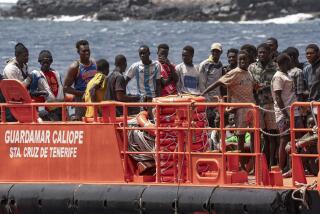Mass arrivals over, hundreds of young migrants remain stuck at Spain-Morocco border

- Share via
CEUTA, Spain — With crossings of migrants apparently under control, Spain and Morocco turned their attention Thursday to the plight of hundreds of teenagers stranded on both sides of the border amid one of the biggest diplomatic spats between the two countries in recent years.
In Ceuta, the Spanish enclave at the center of the dispute on the northern African coast, hundreds of unaccompanied minors were cramming for a 10-day compulsory quarantine in charity-run warehouses under police watch. Some climbed onto the buildings’ roofs to escape.
Looking for some extra clothes to protect against the evening’s cold, a 14-year-old boy who had left the poor conditions in the warehouse explained that his attempt for a life in Spain had been agreed to by his parents.
“They see that if I come here I can have a future,” said the boy, who had traveled from Tetouan, a city about 25 miles south of the Spanish border. “You see your parents can’t work; the education system is very weak. What can I say? I cannot even tell you what people eat.”
A 15-year-old boy from Fnideq, the town just across the frontier, said he crossed over Monday when Moroccan police announced that the border was open.
“The Moroccans told us, ‘Go go, pass pass.’ They let us cross. I was just swimming and I saw people crossing so I went, too,” he said from inside a holding pen with other youngsters. “They have us locked as if we were in a prison. Morocco was a prison and Spain is now also a prison.”
An unprecedented 8,000 people have streamed into the Spanish city of Ceuta from Morocco in the past two days, straining ties between Madrid and Rabat.
Madrid has announced that 200 of the young migrants who were already in Ceuta (population 85,000) before this week’s sudden surge in arrivals would be transferred to the Spanish mainland in coming days in order to leave space in government-run facilities in Ceuta. Under Spain’s laws, the minors remain under the care of regional authorities until their relatives can be found or they come of age.
Many were also roaming the streets, looking for shelter and food and trying to press on with their dream of reaching Europe. As night fell, dozens of very young men climbed a perimeter barbed-wired fence into the city’s port in the hopes of sneaking onto cargo ships and ferries crossing the Strait of Gibraltar to mainland Spain.
The situation was also chaotic in Fnideq, where many roamed the streets begging for food or money to return to their hometowns after they were expelled from Ceuta or stopped at the border.
Moroccan security forces clashed well into the night with dozens of mostly young men who had gathered on a boulevard leading to the border with Spain, and were hoping to follow the thousands who in previous days swam or jumped over fences to reach European soil.
The number of migrants and asylum-seekers who reached Europe in 2020 is the lowest of the last decade, but many died trying.
The scuffles broke out when police tried to break up the groups of people who had gathered and set fire to a barricade blocking the street. The police moved back but later dispersed the group.
Authorities in Ceuta said Thursday that no migrants crossed overnight into the city.
In previous days, the border between Morocco and Ceuta became porous following warnings from the Moroccan government to Spain that it would face consequences over Madrid’s decision to provide medical treatment to the head of a militant group fighting for the independence of the Western Sahara region annexed by Morocco.
Spanish Defense Minister Margarita Robles said Thursday that her country would not accept being pressured by Morocco with “the use of minors.”
Start your day right
Sign up for Essential California for the L.A. Times biggest news, features and recommendations in your inbox six days a week.
You may occasionally receive promotional content from the Los Angeles Times.
“We are not going to accept being blackmailed,” Robles told Spain’s public radio. “Spain’s integrity is not negotiable and is not at stake. We are going to use all necessary means to guarantee the territorial integrity and to keep vigilance on our frontiers.”
“You don’t play with Spain,” she added.
Spain says that more than 8,000 people crossed into Spanish territory in 48 hours, although at least 5,700 had either been expelled in mass pushbacks criticized by rights groups. Many of those who crossed also returned voluntarily after finding no shelter in Ceuta or possibilities to continue onto the European mainland across the Strait of Gibraltar.
More to Read
Sign up for Essential California
The most important California stories and recommendations in your inbox every morning.
You may occasionally receive promotional content from the Los Angeles Times.












